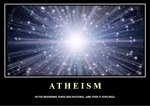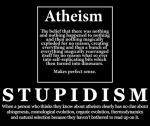You know I could find some mean and funny Christian memes and post them but I won't stoop to danschance's level.
Instead, I will use rational argument.
Burden of proof
Arguments related to the burden of proof deal with whether atheists must disprove theism or theists must prove theism. Conventionally, the
burden of proof lies with someone proposing a positive idea - or as
Karl Popper fans would put it, those who are proposing something
falsifiable. By this standard, atheists have no need to prove anything, and just need to render arguments
for the existence of God as non-compelling. However, the ubiquity of religion in society and history have often shifted the burden of proof to atheists, who must subsequently prove a negative. Assuming that God exists is known as
presuppositionalism and has always been a key tenet of Christian apologetics but is usually rejected by more sensible scholars. The
absurdity of being asked to prove a negative is demonstrated in
Bertrand Russell's
teapot thought experiment - where no matter how hard you look, you can't thoroughly disprove the belief that a teapot is out there in space, orbiting the sun somewhere between Earth and Mars. This sort of presuppositional thinking is illogical, so asking an atheist to disprove God is an unreasonable request.
Occam's razor can also be invoked as a guide to making the fewest assumptions, and assuming God exists
a priori is a major assumption that should be avoided. Combining these thoughts to lay the burden of proof on theists indicates that without supporting evidence, the
default position on God must be either weak-ish atheism or
agnosticism rather than theism. Proponents of atheism argue that the burden of proof has not been met by those proposing that a god exists, let alone the specific gods described by major religions.
Logical
Logical arguments try to show that God cannot possibly exist (at least as described). Barring any
escape hatch arguments like
Goddidit, some properties of God are not compatible with each other or known facts about the world, and thus a creator-god cannot be a logically consistent and existent entity. These arguments are heavily dependent on the use of common descriptions of the Abrahamic God as a target; things such as omnipotence, omnipresence, and omnibenevolence. As a result, they are not as useful in trying to refute the claims of, say,
Neopaganism, and are also vulnerable to the tactic of
moving the goalposts by changing the descriptions of God.
The
omnipotence paradox postulates that true omnipotence is not logically possible or not compatible with omniscience. This is primarily a logical argument based on the general question of whether an omnipotent being could limit its own power - if yes, it would cease to be omnipotent, if no, it wouldn't be omnipotent. Hence the paradox that shows, through contradiction, that God cannot exist as usually described.
Other logical arguments try to prove that god is not compatible with our scientific knowledge of reality. The
Problem of evil states that a good god wouldn't permit gratuitous evil, yet such evil occurs, so a good god does not exist.[SUP]
[21][/SUP] The
argument from design is often given as proof of a creator, but it raise the following logical question: if the world is so complex that it must have had a creator, then the creator must be at least as complex and must therefore have a creator, and this would have to have had a more complex creator
ad infinitum.
While believers hasten to point out that their gods don't need to follow logic, let alone the known laws of physics, this is really a case of
special pleading and doesn't so much prove anything itself. Atheists therefore tend to reject these counters to the logical arguments as they mostly
beg the question of a creator's existence and, very arbitrarily, plead that a creator can be exempt from the same logic that was used to "prove" its existence.
Evidential
At the root of the worldview of most atheists is evidence, and atheists point out that sufficient evidence for the existence of gods is currently very lacking, and thus there is no reason to believe in them. Evidential arguments are less ambitious than logical arguments because, rather than proving that there is reason
not to believe in a god, they prove that there is no reason
to believe in a god (See
Burden of proof above). It is important to remember that what constitutes
sufficient evidence can be quite subjective, although
rationalism and
science do offer some standardization. Various "holy books" exist that testify to the existence of gods, and claim that alleged miracles and personal experiences all constitute evidence in favor of the existence of a god character of some sort. However, atheists reject these as insufficient because the naturalistic explanations behind them (tracing authors of the holy texts, psychological experiments, and scientific experiments to explain experiences, and so on) are more plausible - indeed, the very existence of plausible naturalistic explanations renders the
supernatural explanations obsolete.
Atheists often cite evidence that processes attributed to a god might also occur naturally as evidential arguments. If
evolution and the
big bang are true, then why would a creator god have needed them?[SUP]
[22][/SUP]
Occam's razor makes theistic explanations less compelling.



